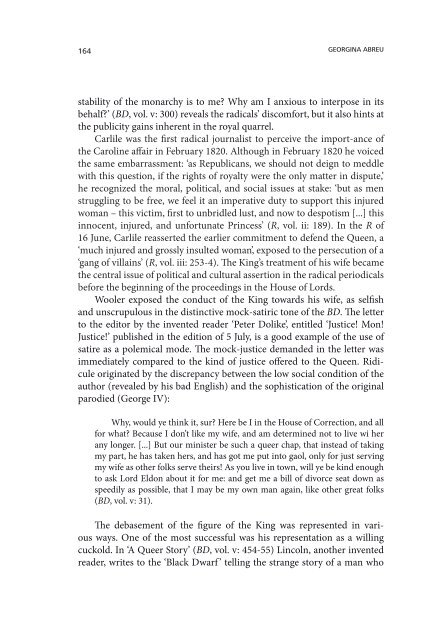Diacritica 25-2_Filosofia.indb - cehum - Universidade do Minho
Diacritica 25-2_Filosofia.indb - cehum - Universidade do Minho
Diacritica 25-2_Filosofia.indb - cehum - Universidade do Minho
Create successful ePaper yourself
Turn your PDF publications into a flip-book with our unique Google optimized e-Paper software.
164<br />
GEORGINA ABREU<br />
stability of the monarchy is to me? Why am I anxious to interpose in its<br />
behalf?’ (BD, vol. v: 300) reveals the radicals’ discomfort, but it also hints at<br />
the publicity gains inherent in the royal quarrel.<br />
Carlile was the fi rst radical journalist to perceive the import-ance of<br />
the Caroline aff air in February 1820. Although in February 1820 he voiced<br />
the same embarrassment: ‘as Republicans, we should not deign to meddle<br />
with this question, if the rights of royalty were the only matter in dispute,’<br />
he recognized the moral, political, and social issues at stake: ‘but as men<br />
struggling to be free, we feel it an imperative duty to support this injured<br />
woman – this victim, fi rst to unbridled lust, and now to despotism [...] this<br />
innocent, injured, and unfortunate Princess’ (R, vol. ii: 189). In the R of<br />
16 June, Carlile reasserted the earlier commitment to defend the Queen, a<br />
‘much injured and grossly insulted woman’, exposed to the persecution of a<br />
‘gang of villains’ (R, vol. iii: <strong>25</strong>3-4). Th e King’s treatment of his wife became<br />
the central issue of political and cultural assertion in the radical periodicals<br />
before the beginning of the proceedings in the House of Lords.<br />
Wooler exposed the conduct of the King towards his wife, as selfi sh<br />
and unscrupulous in the distinctive mock-satiric tone of the BD. Th e letter<br />
to the editor by the invented reader ‘Peter Dolike’, entitled ‘Justice! Mon!<br />
Justice!’ published in the edition of 5 July, is a good example of the use of<br />
satire as a polemical mode. Th e mock-justice demanded in the letter was<br />
immediately compared to the kind of justice off ered to the Queen. Ridicule<br />
originated by the discrepancy between the low social condition of the<br />
author (revealed by his bad English) and the sophistication of the original<br />
parodied (George IV):<br />
Why, would ye think it, sur? Here be I in the House of Correction, and all<br />
for what? Because I <strong>do</strong>n’t like my wife, and am determined not to live wi her<br />
any longer. [...] But our minister be such a queer chap, that instead of taking<br />
my part, he has taken hers, and has got me put into gaol, only for just serving<br />
my wife as other folks serve theirs! As you live in town, will ye be kind enough<br />
to ask Lord El<strong>do</strong>n about it for me: and get me a bill of divorce seat <strong>do</strong>wn as<br />
speedily as possible, that I may be my own man again, like other great folks<br />
(BD, vol. v: 31).<br />
Th e debasement of the fi gure of the King was represented in various<br />
ways. One of the most successful was his representation as a willing<br />
cuckold. In ‘A Queer Story’ (BD, vol. v: 454-55) Lincoln, another invented<br />
reader, writes to the ‘Black Dwarf ’ telling the strange story of a man who<br />
<strong>Diacritica</strong> <strong>25</strong>-2_<strong>Filosofia</strong>.<strong>indb</strong> 164 05-01-2012 09:38:28











![Programa [pdf] - cehum - Universidade do Minho](https://img.yumpu.com/17305425/1/190x135/programa-pdf-cehum-universidade-do-minho.jpg?quality=85)




